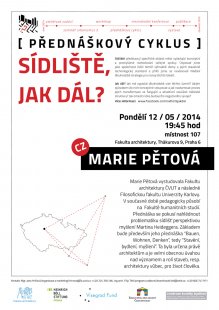
Marie Pětová within the series Housing Estate, what next?
Housing Estates represent specific areas of cities requiring conceptual and thoughtful decision-making by public administration. Their spatial structure brings complications in both economic and social sustainability. So far, as a society, we have dealt almost exclusively with buildings and their construction technology standards, neglecting the search for a long-term strategy for the development of these locations. Finding answers to questions about the future development of these specific areas thus represents one of the most important topics in spatial planning and urban management.
We invite you to the fifth lecture in the series “Housing Estates: What Next?” in which this time architect and philosopher Marie Pětová will speak. The lecture will attempt to address the issue of housing estates from the perspective of Martin Heidegger's thinking. The basis will primarily be his lecture “Bauen, Wohnen, Denken,” that is, “Building, Living, Thinking.” It was aimed specifically at architects and is a very general reflection on the significance and role of buildings, or architecture in general, for human life.
The lecture will take place at the Czech Technical University Faculty of Architecture in Dejvice on Monday, May 12 at 19:45 in room 107.
The lecture is part of an extensive research project “Housing Estates: What Next?” organized by the Czech Technical University Faculty of Architecture in cooperation with the Housing Quality Center, the Heinrich Böll Foundation Prague, and the National Network of Healthy Cities. The project is supported by the Visegrad Fund.
The project “Housing Estates: What Next?” explores the possibilities of transforming existing housing estate units into functioning and attractive parts of the urban structure. Part of the project includes a studio assignment in the Kohout-Tichý studio, a student workshop, and a series of six thematic lectures. In the first part of the lecture series, experts from the Visegrad countries will present the issues of housing estates in Central Europe, followed by Czech specialists from architecture, urban planning, and theorists who engage with the topic of housing estates in their work. An international conference is planned for the autumn of this year, which will present the findings of case studies and analyses developed in the studio and will also feature guests from Germany, France, and the Netherlands, who will present completed or ongoing regeneration of housing estates, both in terms of substance (principles) and process (the role of public administration). The project concludes with a traveling exhibition, which will be launched at the Czech Technical University Faculty of Architecture and subsequently presented in cities and urban areas that participated in the project. The theoretical knowledge gained during the various phases of the project “Housing Estates: What Next?” will also be summarized in a publication that will also outline basic recommendations for the transformation of Czech housing estates.
More information >
We invite you to the fifth lecture in the series “Housing Estates: What Next?” in which this time architect and philosopher Marie Pětová will speak. The lecture will attempt to address the issue of housing estates from the perspective of Martin Heidegger's thinking. The basis will primarily be his lecture “Bauen, Wohnen, Denken,” that is, “Building, Living, Thinking.” It was aimed specifically at architects and is a very general reflection on the significance and role of buildings, or architecture in general, for human life.
The lecture will take place at the Czech Technical University Faculty of Architecture in Dejvice on Monday, May 12 at 19:45 in room 107.
The lecture is part of an extensive research project “Housing Estates: What Next?” organized by the Czech Technical University Faculty of Architecture in cooperation with the Housing Quality Center, the Heinrich Böll Foundation Prague, and the National Network of Healthy Cities. The project is supported by the Visegrad Fund.
The project “Housing Estates: What Next?” explores the possibilities of transforming existing housing estate units into functioning and attractive parts of the urban structure. Part of the project includes a studio assignment in the Kohout-Tichý studio, a student workshop, and a series of six thematic lectures. In the first part of the lecture series, experts from the Visegrad countries will present the issues of housing estates in Central Europe, followed by Czech specialists from architecture, urban planning, and theorists who engage with the topic of housing estates in their work. An international conference is planned for the autumn of this year, which will present the findings of case studies and analyses developed in the studio and will also feature guests from Germany, France, and the Netherlands, who will present completed or ongoing regeneration of housing estates, both in terms of substance (principles) and process (the role of public administration). The project concludes with a traveling exhibition, which will be launched at the Czech Technical University Faculty of Architecture and subsequently presented in cities and urban areas that participated in the project. The theoretical knowledge gained during the various phases of the project “Housing Estates: What Next?” will also be summarized in a publication that will also outline basic recommendations for the transformation of Czech housing estates.
More information >
The English translation is powered by AI tool. Switch to Czech to view the original text source.

0 comments
add comment
Related articles
0
19.05.2014 | Ivan Plicka within the series Housing Estate, what next?
0
29.04.2014 | Martin Veselý in the context of the series Housing Estate, what's next?
0
24.04.2014 | Ryszard Nakonieczny in the series Housing Estate, what next?
0
11.04.2014 | Melinda Benkö as part of the series Settlement, what next?
0
24.03.2014 | Housing estate, what next? - lecture series









